Are you in the hotel industry, feeling the pressure to become more eco-friendly? It’s a huge challenge when waste from plastics and operations seems unavoidable. This not only hurts our planet but also risks alienating modern, eco-conscious travelers. The good news is that a shift to sustainability is possible and profitable, transforming your challenges into opportunities for innovation and guest loyalty.
Top hotels embrace sustainability by eliminating single-use plastics with bulk dispensers and biodegradable alternatives, implementing energy-efficient systems, and reducing food waste through smart sourcing and composting programs. They partner with certified suppliers for eco-friendly amenities, from PLA containers to bagasse tableware. This strategy not only cuts operational costs but also enhances brand reputation and attracts a growing market of environmentally aware guests, proving that green practices are smart business.
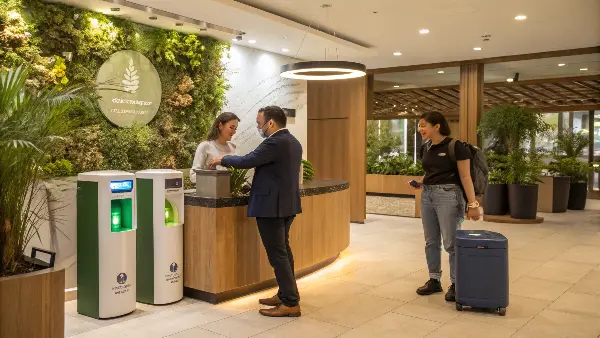
I remember talking to a hotel manager in Vancouver who felt completely overwhelmed by the idea of "going green." He pictured a massive, expensive overhaul. But as we’ve seen at Ecosourcecn time and again, the journey to sustainability isn’t about one giant leap. It’s about a series of smart, deliberate steps that add up to a huge impact. Let’s break down what those steps look like and how leading hotels are making them work.
How are Hotels Successfully Eliminating Single-Use Plastics?
The sight of overflowing bins filled with tiny shampoo bottles and plastic cups is a familiar problem for hoteliers. This mountain of waste is not only an environmental issue but also a growing concern for guests who now demand greener options. By replacing these items with sustainable alternatives, hotels can significantly reduce their footprint and enhance their modern, premium image, turning a problem into a marketing advantage.
Hotels are successfully eliminating single-use plastics by replacing miniature toiletries with stylish, refillable bulk dispensers and swapping plastic water bottles for in-room filtration systems with glass carafes. For food service, they are adopting compostable PLA or bagasse containers and cutlery. Furthermore, they are replacing PVC key cards and plastic bin liners with biodegradable or recycled alternatives, partnering with suppliers who can provide certified, high-quality products at scale.
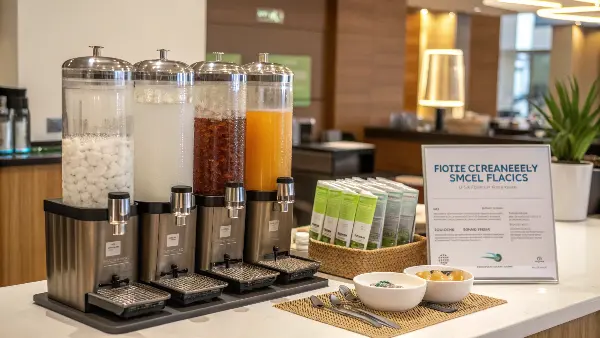
When I first started in this industry, the focus was almost entirely on the bathroom. Miniature toiletries were seen as a sign of luxury. Now, the conversation has completely changed. The real leaders in hospitality are looking at every single touchpoint where plastic is used and asking, "Is there a better way?" This holistic approach is what separates true sustainability from simple greenwashing. It’s a fundamental shift in operations.
Rethinking In-Room Amenities
The most visible change for guests starts right in their room. But it goes far beyond just shampoo.
- Toiletries: The move from tiny plastic bottles to elegant, tamper-proof bulk dispensers is the biggest win. It dramatically cuts plastic waste and can reduce toiletry costs by over 50%. Brands like Marriott and IHG have made this a global standard.
- Water Supply: The single-use plastic water bottle is on its way out. Top hotels are installing high-quality water filtration taps in rooms and providing branded, reusable glass bottles. Others set up hydration stations in common areas. This not only eliminates plastic but elevates the guest experience.
- Coffee a`nd Tea: Those single-serve coffee pods are a huge source of waste. Innovative hotels are switching to compostable pods, providing French presses with locally sourced coffee, or using bean-to-cup machines.
Operational Plastics: The Hidden Culprits
The plastics guests don’t always see are just as important. Think about the back-of-house operations. Hotels are now using compostable bin liners in guest rooms and public areas. They are also replacing plastic laundry bags with reusable cloth or compostable options. Even the classic PVC key card is being phased out in favor of cards made from wood, bamboo, or PLA, which gives a fantastic first impression at check-in.
| Traditional Item | Common Material | Sustainable Alternative | Key Benefit |
|---|---|---|---|
| Shampoo/Soap | Mini Plastic Bottles | Bulk Dispensers, Solid Bars | Reduces plastic waste by 80%+ and lowers cost |
| Water Bottles | Single-Use PET | Glass Bottles, Water Stations | Eliminates plastic waste, offers premium feel |
| Room Key Cards | PVC Plastic | Wood, Bamboo, PLA | Biodegradable, unique branding opportunity |
| Coffee Pods | Plastic & Aluminum | Compostable Pods, French Press | Reduces hard-to-recycle waste |
| Takeaway Cups | Plastic or PE-Lined Paper | PLA or Bagasse Lids & Cups | Fully compostable, guest-friendly |
What Sustainable F&B Practices are Top Hotels Adopting?
A hotel’s food and beverage department can be a major source of waste, from buffet leftovers to single-use takeaway containers. This not only carries a high financial cost but also contradicts the sustainable image many hotels want to project. Ignoring this area means missing a huge opportunity to improve efficiency, cut costs, and appeal to diners who increasingly care about where their food comes from and what happens to the waste.
Top hotels are implementing comprehensive F&B sustainability programs that include sourcing ingredients from local farms to reduce food miles and support communities. They use AI-powered systems to track and minimize food waste, and they are replacing all single-use plastic tableware with fully compostable alternatives like bagasse plates and PLA cutlery for room service and events. Many also have on-site composting programs that turn unavoidable scraps into valuable soil.
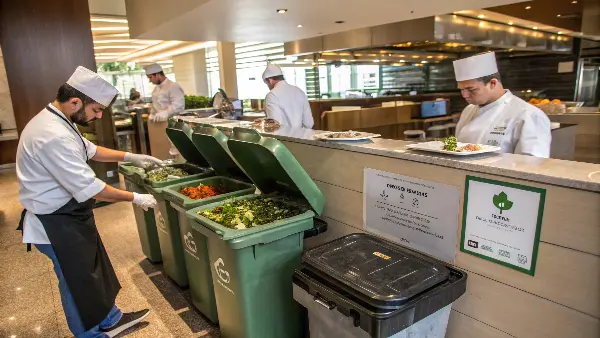
I once worked with a resort in Asia that was struggling with its F&B waste. The manager pointed to a huge bin of leftover breakfast buffet food and said, "That’s my biggest headache." By simply changing the size of the serving plates and monitoring which dishes were most popular, they cut their food waste by nearly 30% in a few months. It showed me that sustainable F&B isn’t just about compostable forks; it’s a smarter, more efficient way of doing business from start to finish.
The Farm-to-Table Philosophy
The journey begins long before the food reaches the plate. Leading hotels are building strong relationships with local farmers and suppliers. This "farm-to-table" approach has multiple benefits.
- Reduces Carbon Footprint: Sourcing locally drastically cuts down on transportation emissions, also known as "food miles."
- Fresher, Higher-Quality Ingredients: The food is fresher, more flavorful, and allows chefs to create seasonal menus that highlight the local region.
- Supports the Local Economy: It creates a positive feedback loop, investing money back into the community, which guests appreciate.
Tackling Food and Packaging Waste
Once the food is on-site, the focus shifts to minimizing waste. This is where technology and smart material choices come into play.
- Waste Reduction Tech: Hotels are using smart systems like Winnow Vision, which uses AI to identify and measure what food is being thrown away. This data helps chefs refine their purchasing and production to prevent over-preparation.
- Compostable Packaging: For room service, poolside dining, or grab-and-go options, plastic is a non-starter. This is where products from Ecosourcecn become essential. Hotels are using bagasse containers made from sugarcane pulp, PLA cups made from corn starch, and CPLA cutlery that can withstand high temperatures. These items can be composted along with food scraps, creating a closed-loop system.
- On-Site Composting: pioneering hotels are installing their own composting systems. They turn kitchen scraps and compostable tableware into nutrient-rich soil used for the hotel’s on-site gardens, where they might grow herbs for the kitchen. This is the circular economy in action.
Can Sustainable Practices Actually Enhance the Guest Experience?
Many hoteliers worry that "eco-friendly" might be perceived by guests as a compromise on luxury or convenience. They fear that replacing familiar amenities or changing operational standards could lead to complaints. This hesitation can prevent them from adopting meaningful sustainable practices, causing them to fall behind competitors who are successfully proving that green and luxury can coexist beautifully and even enhance one another.
Absolutely. Sustainable practices enhance the guest experience by offering a more authentic, meaningful stay. Guests feel good about choosing a hotel that aligns with their values. Features like high-quality, locally sourced food, beautifully designed refillable amenity dispensers, and the quiet efficiency of green technology all contribute to a premium experience. Communicating these efforts tells a powerful story that builds brand loyalty and creates a deeper connection with modern travelers.
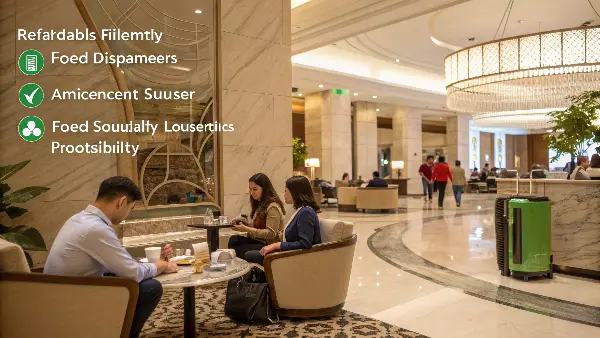
I remember staying at a hotel that had replaced plastic water bottles with a sleek glass carafe and a note explaining their commitment to reducing plastic waste. It didn’t feel like a sacrifice at all; it felt thoughtful and premium. That small detail made me feel better about my stay and more loyal to their brand. The key is in the execution and communication. When done right, sustainability doesn’t take anything away from the experience—it adds a layer of purpose and quality that guests truly value.
Making Green Feel Luxurious
The perception of luxury is shifting. Today, it’s less about excess and more about quality, authenticity, and well-being. Sustainable practices tap directly into this new mindset.
- Design and Materials: Hotels are incorporating natural, reclaimed, and recycled materials into their design, creating spaces that feel both calming and sophisticated. Think reclaimed wood furniture, recycled glass countertops, and organic cotton linens.
- Health and Wellness: Sustainability is closely linked to guest wellness. Using non-toxic cleaning supplies improves air quality. Offering farm-to-table dining provides healthier, tastier food. These elements contribute to a restorative experience that guests seek.
- Quiet Technology: Modern green technology operates silently in the background. Energy-efficient HVAC systems provide perfect climate control without noise, and smart lighting adjusts to create the right ambiance. The most luxurious technology is often the one you don’t notice.
The Power of Storytelling and Engagement
Simply implementing green practices isn’t enough; you have to share the story with your guests. This turns operational changes into memorable experiences.
- Communicate Your "Why": Use small cards in the room, information on the TV, or notes on the menu to explain your initiatives. For example: "This water is filtered on-site to eliminate 50,000 plastic bottles a year. Thank you for helping us."
- Offer Opt-In Programs: Empower guests to participate. Offer loyalty points or a restaurant voucher for forgoing daily housekeeping. This makes guests feel like partners in your sustainability mission.
- Showcase Local Connections: Highlight your partnerships with local farms, artisans, and community projects. This gives guests a deeper sense of place and shows that your hotel is a positive force in the local ecosystem. By showing them the impact, you make their stay more meaningful.
What Should Hotels Look for in a Sustainable Supplier?
A hotel’s sustainability goals are only as strong as its supply chain. Choosing the wrong supplier can lead to major problems, from receiving products that don’t meet environmental claims to experiencing supply disruptions that affect guest service. Partnering with someone who provides low-quality "green" products or can’t deliver on time can damage your brand’s reputation and create operational nightmares.
Hotels should look for a sustainable supplier who is a true partner, not just a vendor. This means they must provide globally recognized certifications like BPI, OK compost, and FSC to validate their claims. The ideal partner offers a wide range of high-quality, customizable products, demonstrates a reliable supply chain, and provides transparent communication. They should act as an expert resource, helping you navigate compliance and find the best solutions for your specific needs.
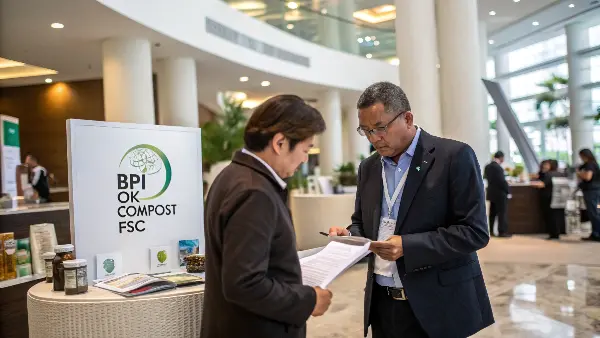
In my role at Ecosourcecn, I’ve seen firsthand what happens when a hotel chooses a supplier based on price alone. I spoke with a procurement manager, someone like Jacky from Canada, who had to recall an entire shipment of "compostable" cutlery because it didn’t break down as promised. The fallout was immense. It taught us both a valuable lesson: authentic sustainability requires partnership with suppliers who are as committed to integrity and quality as you are.
Certification and Transparency are Non-Negotiable
This is the absolute foundation of a good partnership. Without it, you are operating on blind faith.
- Validate the Claims: Don’t just take a supplier’s word for it. Ask for documentation for certifications like BPI (for North America) or TÜV AUSTRIA (OK compost for Europe). For paper products, look for FSC (Forest Stewardship Council) certification. These guarantee that the products have been third-party tested and meet international standards.
- Traceability: A good supplier should be able to tell you where their raw materials come from and how their products are made. This transparency protects you from greenwashing and ensures ethical sourcing.
Product Quality, Customization, and Scalability
A supplier needs to offer more than just a certificate. Their products and services must meet the high standards of the hospitality industry.
- Performance is Key: An eco-friendly product that fails is worse than no product at all. Does the compostable coffee cup leak? Can the CPLA cutlery handle a hot steak? Ask for samples and test them rigorously under real-world conditions.
- Customization and Branding: Your amenities are part of your brand. A great partner, like us at Ecosourcecn, can offer private label services, allowing you to print your logo on cups, sleeves, and containers. This reinforces your brand identity while showcasing your commitment to sustainability.
- Scalability and Reliability: The hospitality industry has peaks and valleys. Can your supplier handle a large order for a major conference and still provide your regular stock on time? A reliable global logistics network and a robust inventory management system are crucial signs of a dependable partner.
Conclusion
The hotel industry’s shift towards sustainability is no longer a niche trend; it’s a fundamental change in how business is done. By eliminating plastics, innovating in F&B, and choosing the right partners, hotels are not only reducing their environmental impact but also cutting costs, enhancing the guest experience, and building stronger, more resilient brands for the future.


